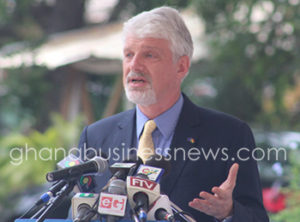EU supports three governance institutions with €4.82 m

The European Union as part of efforts to help further deepen Ghana’s democratic process, has released a € 4.82 million grant to support the operations of three key governance institutions towards the 2016 general election.
The Electoral Commission (EC) would receive €2.9 million, the National Commission on Civic Education (NCCE) €1.77 million, and the National Media Commission (NMC) €150,000.
The aim of the support is to enhance the capacities of these institutions to effectively execute their constitutional mandates.
Activities under the grant are mainly geared towards peaceful and successful general election on November 7, where both the victors and the vanquished would accept the results.
The support for the EC targets all aspects of election administration across the electoral cycle (2016-2018), ranging from pre-election, preparation to the announcement of results and post-election activities.
Under the grant, the NCCE would among other things strengthen its institutional capacity to deliver voter education and awareness on the electoral cycle, including the use of modern media platforms.
On the media front, the grant is to support a secure, free and responsible regulatory environment for media practice during the election.
The NMC is therefore expected to monitor the media to ascertain how they cover key stakeholders in the electoral process including the political parties, their candidates, as well as the EC, the NCCE and the National Peace Council (NPC).
Mr William Hanna, the Head of the EU Delegation in Ghana, speaking at the signing of the agreement on Wednesday in Accra said, the three governance institutions have a good track record, and the EU was giving them the tools to do even better in the future.
“We also support the efforts of the NPC and other actors to create the conditions for peaceful and violence-free elections,” he said.
“Another important element of the electoral process, and not only in Ghana, is the existence of a level playing field where all actors have equal possibilities to inform the electorate and where real issue-based debates happen throughout the campaign,” he said.
He announced that an EU exploratory mission would soon visit Ghana to assess if the EU Observation Mission could be deployed for the forthcoming electoral process.
Mrs Charlotte Osei, the Chairperson, EC, said: “How strong the NCCE and NMC is, impacts directly on our work and how weak they are impacts directly on our work hence it is significant that the EU supports all three independent governance institutions.”
“And because the support is coming from one body and spread across all three, it enables us to work together more efficiently and in a collaborative manner towards the elections.”
She said the EC with the EU sponsorship is carrying out very significant reforms after the 2012 elections, which are being implemented in this year’s elections.
“The EU grant will enable us to ensure that the elections we are going to have in November are going to be more transparent, more inclusive and certainly would be carried out in a more efficient manner,” she said.
“What makes it more credible is that the EC would be able to publish the results of every Presidential and Parliamentary election from the polling stations. It is a key transparency initiative that is certainly more credible and transparent,” she stated.
Mr George Sarpong, the Executive Secretary of the NMC, expressed gratitude to the EU for the support; which he described as the life-line of the Media Commission.
Mr Samuel Akuamoah Boateng, the Deputy Chairman of Programmes, NCCE, said the Commission would be carrying out a research on voter expectations towards the upcoming general election.
He explained that based on the findings of the research, the NCCE would organised a presidential candidates debate, as well as offer a common platform for parliamentary candidates to meet their constituents to enable them spell out how they would address the issues raised in the study.
Finance Minister Mr Seth Terkper acknowledged the role of Ghana’s development partners such as the EU in the nation’s socio-economic development and said the grant would go a long way to complement government’s budgetary allocations to the three governance institutions.
Source: GNA
